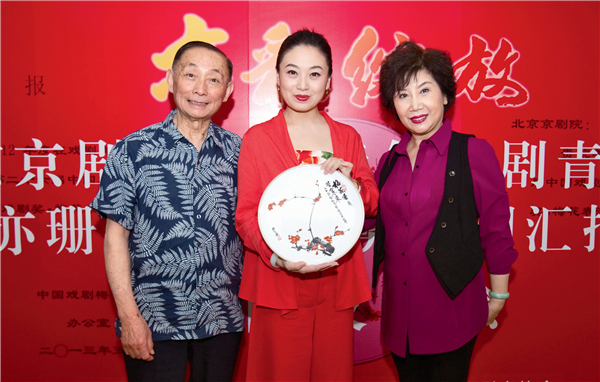 |
|
Mei Baojiu (1934-2016), Jiang Yishan and Xue Yaping (from left to right) [Photo/Women of China] |
Keep Learning
Jiang practiced ballet dancing for more than two years after she turned 6. At the age of 11, she was admitted to Shenyang Art School to study Peking opera. She actually took the entrance exams for both dancing and Peking opera. She earned a higher grade on the opera exam, even though she had not previously studied opera.
Jiang was more than 1.6 meters tall at that time. The school's teachers said she had a good shape and a good voice, and so she was a suitable Peking opera student.
As it turned out, Jiang had a talent for learning Peking opera. She was modest and intelligent, and she learned quickly. After three months, the school organized a party for the students, during which they performed on stage. Jiang gave a good performance.
Jiang joined Shenyang Peking Opera Troupe in 1996. Her beautiful stage appearance, posture and singing impressed many Peking opera fans.
In June 2000, Jiang transferred to Tianjin Jingju Theatre Company, in North China's Tianjin Municipality. The year, 2000, marked the 80th anniversary of Zhang's birth. A series of performances were staged in September that year. Jiang began studying under Xue in September 2000. Under Xue's guidance, Jiang greatly improved her skills.
After she completed her postgraduate courses, at the National Academy of Chinese Theatre of Arts, in Beijing in March 2007, Jiang joined Mei Lanfang Peking Opera Troupe, under the Jingju Theatre Company of Beijing.
Her humble attitude and splendid performance touched Mei Baojiu, and he promised to teach her in February 2008.
Promoting Peking Opera on Campus
Peking opera is one of China's national treasures. Peking opera performers generally are concerned about inheriting and promoting Peking opera. Jiang's view of inheriting Peking opera is unique.
"As Peking opera performers, it is our responsibility and obligation to inherit the traditional Chinese art form. We should not only learn from our predecessors, we should also teach the next generation the traditional art form. Only when the younger generation loves Peking opera, will the art truly have vitality. We should not only cultivate Peking opera performers, we should also cultivate Peking opera fans and spectators," Jiang says.
She has always paid attention to the inheritance of Peking opera, and she has tried her best to teach the art form to younger generations.
Since 2012, when she became a member of the Beijing Municipal Committee of the Chinese People's Political Consultative Conference (CPPCC), she has been dedicated to promoting the traditional art form among students.
During the students' extracurricular activities, Jiang helps the students learn about Peking opera, experience the charm of the traditional art form and develop a passion for traditional Chinese culture. Jiang says it is crucial that children have a better understanding of the essence of traditional Chinese culture through learning Peking opera.
She has served as a Peking opera instructor at Beijing-based Shijia Primary School since 2016. Under her guidance, hundreds of pupils have learned Peking opera, and they have performed on stage.
This year, Jiang began teaching Peking opera at Cotton Kindergarten, in Beijing. The children won the first prize at the local Peking opera competition among kindergarten children.
Jiang says it is important to provide cultural and artistic enlightenment and education to children in the first few grades of primary school.